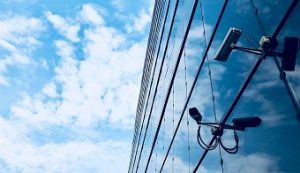
Human beings have a long-standing relationship with privacy and security. For centuries, we’ve locked our doors, held close our most precious possessions, and been wary of the threats posed by thieves. As time has gone on, our relationship with security has become more complicated as we’ve now got much more to be protective of. As technological advancements in security have got smarter and stronger, so have those looking to compromise it.
Cybersecurity, however, is still incredibly new to humans when we look at the long relationship that we have with security in general. As much as we understand the basics, such as keeping our passwords secure and storing data in safe places, our understanding of cybersecurity as a whole is complicated and so is our understanding of the threats that it protects against.
However, the relationship between physical security and cybersecurity is often interlinked. Business leaders may find themselves weighing up the different risks to the physical security of their business. As a result, they implement CCTV into the office space, and alarms are placed on doors to help repel intruders.
But what happens when the data that is collected from such security devices is also at risk of being stolen, and you don’t have to break through the front door of an office to get it? The answer is that your physical security can lose its power to keep your business safe if your cybersecurity is weak.
As a result, cybersecurity is incredibly important to empower your physical security. We’ve seen the risks posed by cybersecurity hacks in recent news. Video security company Verkada recently suffered a security breach as malicious attackers obtained access to the contents of many of its live camera feeds, and a recent report by the UK government says two in five UK firms experienced cyberattacks in 2020. Cloud computing offers a solution. The cloud stores your information in data centres located anywhere in the world and is maintained by a third party, such as Claranet. As the data sits on hosted servers, it’s easily accessible while not being at risk of being stolen through your physical device.
Here’s why cloud computing can help to ensure that your physical security and the data it holds aren’t compromised. It’s completely normal to speculate whether your data is safe when it’s stored within a cloud infrastructure. As we are effectively outsourcing our security by storing our important files on servers we have no control over – and, in some cases, limited understanding of – it’s natural to worry about how vulnerable this is to cyber-attacks.
The reality is, the data that you save on the cloud is likely to be a lot safer than that which you store on your device. Cyber hackers can try and trick you into clicking on links that deploy malware or pose as a help desk trying to fix your machine. As a result, they can access your device and if this is where you’re storing important security data, then it is vulnerable.
Cloud service providers offer security that is a lot stronger than the software that is likely in place on your personal computer. Hyperscalers such as Microsoft and Amazon Web Service (AWS) are able to hire countless more security experts than any individual company – save the corporate behemoth – could afford.
These major platform owners have culpability for thousands of customers on their cloud and are constantly working to enhance the security of their platforms. The security provided by cloud service providers such as Claranet is an extension of these capabilities. Cloud servers are located in remote locations that workers don’t have access to. They are also encrypted, which is the process of converting information or data into code to prevent unauthorised access.
Additionally, cloud infrastructure providers like ourselves look to regularly update your security to protect against viruses and malware, leaving you free to get on with your work without any niggling worries about your data being at risk from hackers. Additionally, cloud providers are also able to provide sophisticated security measures and solutions in the form of firewalls and artificial intelligence, as well as data redundancy, where the same piece of data is held within several separate data centres.
This is effectively super-strong backup and recovery, meaning that if a server goes down, you can access your files from a backup server. By storing the data gathered by your physical security in the cloud, you’re not just significantly reducing the risk of cyber-attacks, but also protecting it from physical threats such as damage in the event of a fire or flood.
Rather than viewing your physical and cybersecurity as two different entities, treat them as part of one system: if one is compromised, the other is also at risk. They should work in tandem to keep your whole organisation secure.











